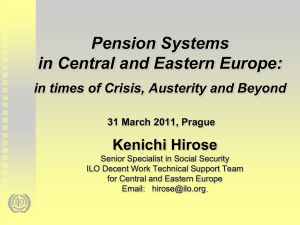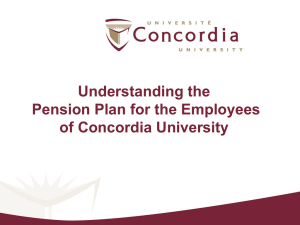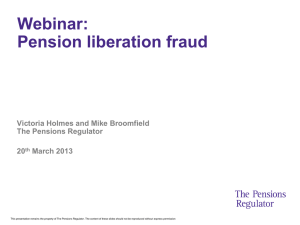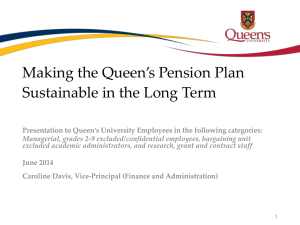Sechele v Public Officers Defined Contribution Pension Fund
advertisement
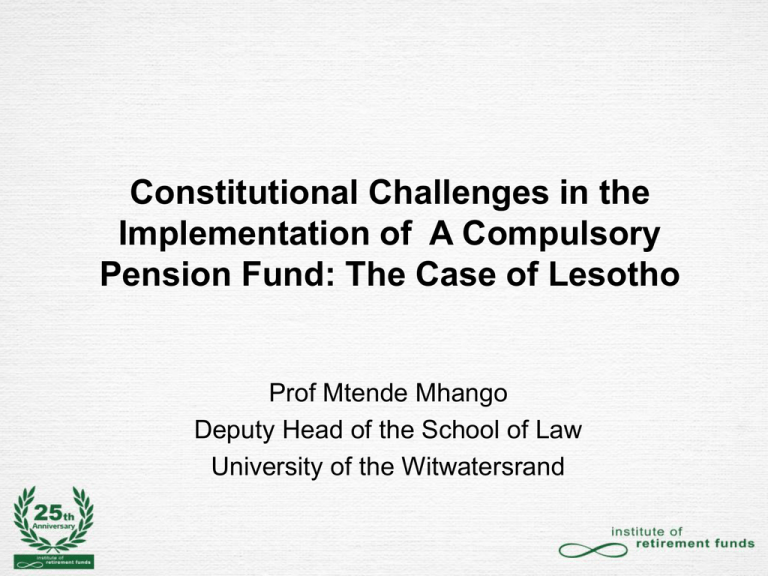
Constitutional Challenges in the Implementation of A Compulsory Pension Fund: The Case of Lesotho Prof Mtende Mhango Deputy Head of the School of Law University of the Witwatersrand Overview 1) Worldwide move from DB to DC Fund 2) Brief synopsis of the judgment in Sechele v Public Officers Defined Contribution Pension Fund [2011] LSCA 23 3) Benefits of the pension reforms in Lesotho 4) Entrenching pension benefits in the Constitution 5) Lessons from Lesotho pension reforms Worldwide Move from DB to DC Fund • What is a DB and DC Fund and its effects? • DB Fund is a fund that pays a specific amount of benefits. It calculates benefits based on salary times number of years of service. Employer bears the investments risk. • DC fund is a fund in which an individual employee’s pension benefit is determined based on the contributions made and the investment earned. The amount of an employee’s actual retirement benefit cannot be determined until he has retired. Employee bears the investment risk. Worldwide Move from DB to DC Fund • Since the 1980s, a worldwide move from DB to DC began. • Employers desire to limit financial commitments associated with DB Funds. • limited choice between DB and DC led to creation of third type of pension fund identified as a hybrid pension fund. • In a hybrid fund, the risk is shared between the employer and employee. • It guarantees a portion of the benefits to the employee and at the same time compel the employee to assume some portion of the investment risk. The Genesis of Lesotho’s Reforms • The pay as you go DB pension system • Funding from the national budget • Government of Lesotho observed that its pension liability was too high to be financed from the recurrent budget, and opted for a properly structured system under the DC Fund. • Government took a policy/political decision to switch from DB to DC funding model and passed the Pension Act Public Officers Pension Act – To establish a standalone independent DC Fund with minimal financial risk to the Government to pay pensions to all public officers – To make pension membership compulsory to all public officers below the age of forty. Sechele v Public Officers Defined Contribution Pension Fund. 1. Compulsory pension contribution and membership requirement 2. Whether the compulsory contribution and membership of the DC Fund violated the property rights in the Constitution 3. Whether sec 27 of the Pension Act violated sec 150(1) & (2) of the Constitution • Sec 27 says “On retirement, a member shall be entitled to a portion of his or her fund credit to the maximum of 25% as cash benefit. The remaining percentage shall be used to purchase an annuity for him or her.” Sechele v Public Officers Defined Contribution Pension Fund • Section 150 of the Constitution provides: • (1) The law to be applied with respect to any pensions benefits that were granted to any person before the coming into operation of this Constitution shall be ...any law in force at a later date that is not less favourable to that person. • (2) The law to be applied with respect to any pensions benefits shall be the law in force on the date on which that period of service commenced, or be any law in force at a later date that is not less favourable to that person. Sechele v Public Officers Defined Contribution Pension • The Court of Appeal read into sec 27 the following provision to cure the defect. • “Provided that the retirement benefits payable to a member shall not be less than the benefits such member would have received under the law with respect to pensions benefits which would have applied if this Act had not been passed” Sechele v Public Officers Defined Contribution Pension • The question is what kind of a fund is the Public Officers Pension Fund? Is it a DC or DB fund? • I argue that it is neither. The Sechele Court imposed the creation of a hybrid public officers pension fund in Lesotho. • The Fund guarantees certain benefits to members, which government is required to pay. • The members do not carry all the risk that members normally do in a DC fund. • The members and employers (Govt) share the investment risk. Lessons from Lesotho Pension Reforms Entrenching pension benefits in the Constitution 1. It constrains the hands of the legislature 2. Consultations are never sufficient when changes to the pension benefits are needed 3.Pension benefits protected Lessons from Lesotho Pension Reforms – – – – – – Political Will Compulsory pension contributions permitted Rule of law (legality) requirement Section 27 of Constitution-reasonableness/rationality Cutting edge research that informs the reforms Public Consultation on pension reforms is a legal requirement – Public Consultation is part of good governance requirement • Malawi consultation on Pension Act 2011 • South Africa’s own pension reforms since 2004 • Benefits include better calculation of political risks and public education which can improve compliance levels. Trade Unions Demonstrate Against the Pension Bill in Malawi in 2011 Pension Act was passed in 2011 Conclusion – Compulsory pension funds is an accepted principle worldwide – Nyambirai v National Social Security Authority & Another, 1996 (1) SA 636 (upholding the national social security scheme) – Steward Machine Company v Davis 301 US 548 (1937)(upholding the New Deal legislation) – Apostolou v The Republic of Cyprus (1985) LRC







